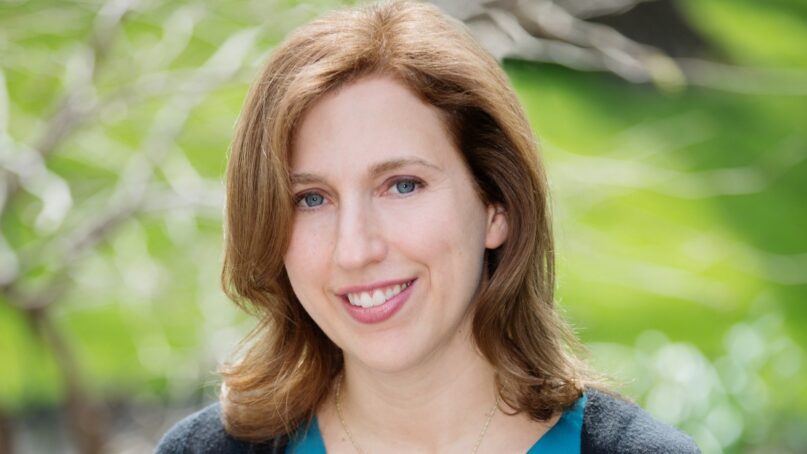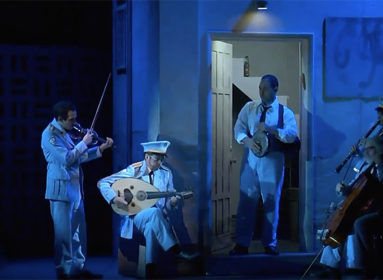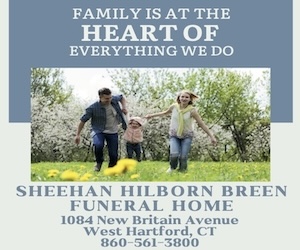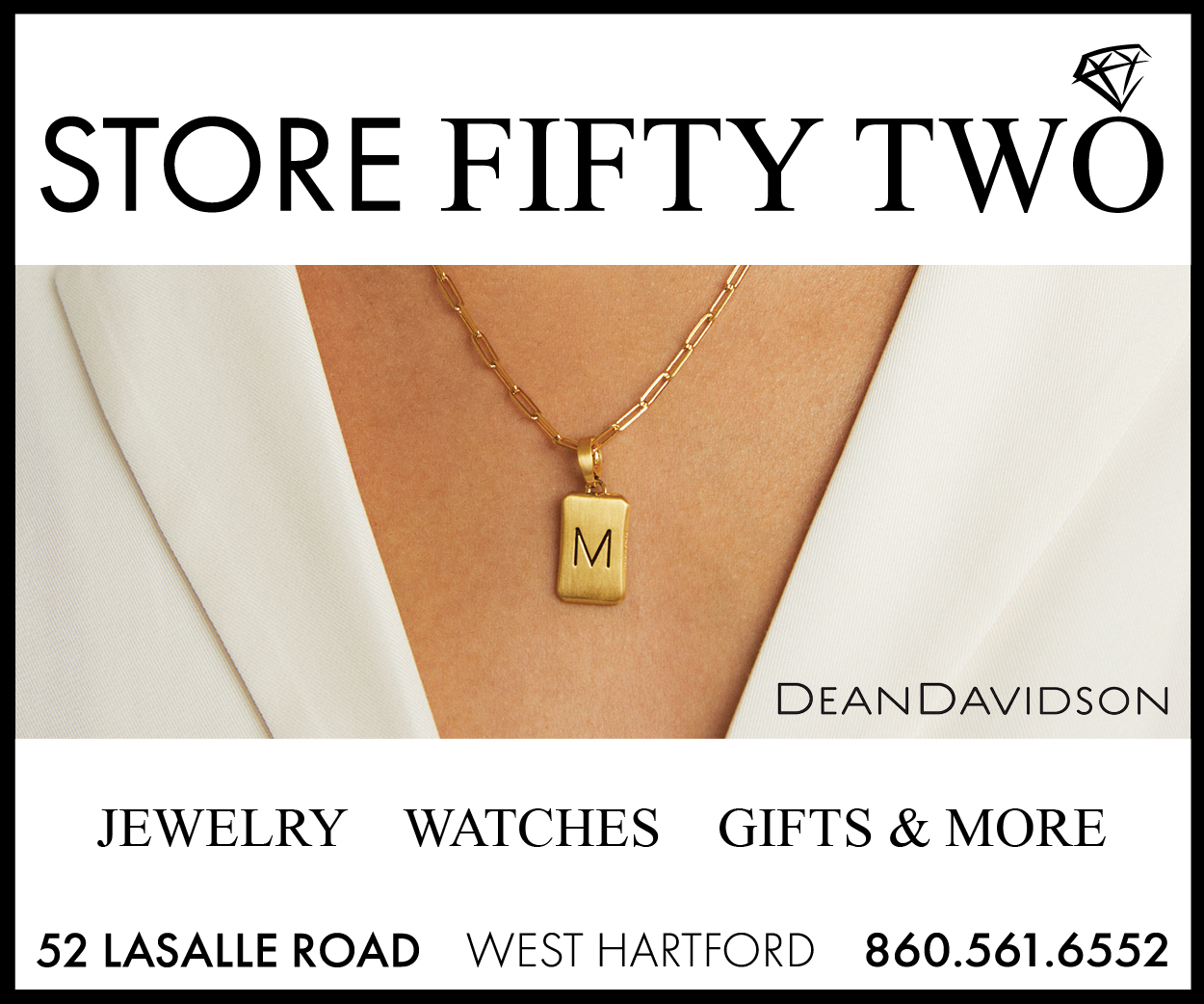
Award-winning writer to speak at Yale about her book People Love Dead Jews
By Stacey Dresner
Dara Horn says she never intended to write a book like People Love Dead Jews. She has always been more interested in celebrating Jewish culture in her five novels.
But over the last several years, Horn has been called on to write essays on subjects like the Holocaust, Anne Frank and the Tree of Life shooting and she came to a realization – that a large number of the pieces she was being asked to write were about dead Jews. Not living Jews.
In People Love Dead Jews, (W.W. Norton & Company, 2021) winner of the National Jewish Book Award, Horn’s goal was to “unravel, document, describe and articulate the endless unspoken ways in which the popular obsession with dead Jews, even in its most apparently benign and civic-minded forms, is a profound affront to human dignity.”
This includes her take on Anne Frank in a chapter entitled “Everyone’s (Second) Favorite Dead Jew”; on “Jewish Heritage sites” today in countries where no Jews remain (discussing her surreal visit to the Jewish sites in the Chinese city of Harbin, which for around 50 years was the home of Russian Jews who thrived before being killed or kicked out); and the myth that Jewish surnames were changed at Ellis Island, and why American Jews were forced to change their names and lie to their children about it.
Horn will be at Yale University in New Haven on March 29 to speak about People Love Dead Jews participating in several sessions with the Yale community during the day and speaking at a public lecture from 7-9 p.m.
The program is sponsored by the Academic Engagement Network (AEN) through its Grant to Support the Fight Against Antisemitism on College; the Office of diversity, Equity and Inclusion at Yale School of Medicine, The Buckley Program, Jewish Community Relations Commission of Greater New Haven, and the Slifka Center.
Horn received her doctorate in comparative literature from Harvard University, studying Yiddish and Hebrew. She has taught courses in these subjects at Sarah Lawrence College and Yeshiva University, and held the Gerald Weinstock Visiting Professorship in Jewish Studies at Harvard. She is the recipient of two National Jewish Book Awards, the Edward Lewis Wallant Award, the Harold U. Ribalow Award, and the Reform Judaism Fiction Prize, and she was a finalist for the Wingate Prize, the Simpson Family Literary Prize, and the Carnegie Medal for Excellence in Fiction. Her nonfiction work has appeared in The New York Times, The Wall Street Journal, The Washington Post, The Atlantic, Smithsonian Magazine, and The Jewish Review of Books, among many other publications, and she is a regular columnist for Tablet Magazine. She lives in New Jersey with her husband and four children.
Horn recently spoke to the Jewish Ledger about “People Love Dead Jews.”
JEWISH LEDGER: The title of this book, “People love Dead Jews” is pretty interesting. Did you come up with it, and was it your goal to shock people a little?
DARA HORN: You know, honestly, I’m still kind of shocked that my publisher let me keep this title. When I was working on this book I remember telling friends, ‘I’m gonna call this book “People love dead Jews” until my publisher makes me change it. And they didn’t make me change it.
The title is actually the first line in the piece that really got me started on writing this book, which was the piece about Anne Frank.
You know, I’ve spent 20 years not writing this book. This is my sixth book and all of my books deal really deeply with Jewish life and culture. I also have a PhD in Hebrew and Yiddish literature, so I teach and write about Jewish culture and I’ve been doing this for 20 years. I always was very resistant to the idea of writing about antisemitism because I wanted to celebrate this living culture.
What happened was I started thinking about this a little differently. A few years ago, in 2018, the Smithsonian approached me and asked me to do this piece for them about Anne Frank, and I just remember feeling so full of dread when I got that request, because this is exactly what I didn’t want to write about. The normal thing of course to do, would have been to turn that assignment down. But I’m a writer, and I’m not a normal person. So I thought, this is interesting–why don’t I want to write about this? And that was when I remembered a news item I had seen about something that had happened at the Anne Frank Museum in Amsterdam earlier that year. It was about a young Jewish man who was working at the museum, who was asked not to wear a yarmulke to work. It was this absurd thing. So, I went back to the Smithsonian Magazine, and said I will write this piece, but I wrote it about this problem.
It’s chapter one of the book and the first line is – “People love dead Jews. Living Jews, not so much.”
I kind of felt like I got this topic out of my system at that point. But that piece came out in a fall issue in 2018 and a few days after that was the shooting at The Tree of Life synagogue. And within hours of that attack, The New York Times called me and asked if I could write a piece on it. And it was like, ‘Everybody wants me to write about dead Jews. I’m just gonna dive into this topic. I just remember joking with my husband about it and saying ‘If I ever turn this into a book, I’m gonna call it People Love Dead Jews, because that hits the nail on the head. I said that as a joke, but my husband was like, I think that’s a great idea.
JL: The full title is People Love Dead Jews: Reports from a Haunted Present. What was your goal in writing this book?
DH: I didn’t envision this as a book about antisemitism honestly, I see this as a book about the role that dead Jews play in the wider world imagination. It basically comes down to two principles in the book.
One is that people tell stories about dead Jews that make them feel better about themselves. And then the other side of that is that living Jews have to erase themselves in order to gain public respect. Those are the two pieces of this dynamic of Jews living in a non-Jewish society. It’s about unpacking these unspoken assumptions of things that we don’t regard as antisemitism.
There’s International Holocaust Remembrance Day. Yay! That’s a good thing, right? But it’s sort of playing a role for society… People tell stories about dead Jews to make them feel better about themselves, and the Holocaust is one of those stories because you go to a Holocaust Museum or are learning about the Holocaust and hopefully you feel terrible about what happened but you feel great about yourself because you’re like, ‘I would never do this.’ We all look great next to Nazis right?
And this is what students are taught in school, basically, that antisemitism consists of genocide that happened a long time ago and far away. And what that means is that anything short of that, like, who cares? It’s setting a ridiculous standard for what we care about.
In the book I also talk about Jewish heritage sites…There are a lot of countries in the world that don’t have Jewish communities anymore, but are like, “Yay for the dead Jews.”
And in terms of living Jews erasing themselves, it’s everywhere. If you think about the way we teach people not to be bigoted in this country, we do this thing where we say, ‘See this group of people over here who you might be bigoted against? You shouldn’t hate those people because they’re just like me and you. They’re just like everyone else.’
That’s the message we send, but the problem with that is the Jews have spent 3000 years not being like everyone else. That is sort of the premise of Judaism. And the problem with that is that the message that we’re then sending to people is, ‘if people aren’t just like me and you and they aren’t like everyone else, then it’s totally fine to hate them.’ And it’s perhaps not surprising that the people who are experiencing almost daily antisemitic attacks in this country are Haredis. [Mimicking antisemites]: “We learned in school not to hate people who are just like us, and these people have weird hairstyles!”
JL: One of the essays in the book discusses the myth that people’s original Jewish sounding names were changed at Ellis Island, but actually Jewish immigrants and their children are the ones who changed their names. You call it an act of love, why?
DH: Because they were protecting their children from psychological damage. These are people who lived with antisemitism. Actually often it was not even the immigrants who changed their names, it was often the children of immigrants, or people would go as a whole family and change their name.
I think that this was really shameful for them, not just because they were giving up their Jewish name, but shameful for a different reason, because the whole reason they had uprooted their lives, or their parents had uprooted their lives to come here, was because coming here was supposed to be the way to avoid antisemitism – and then you feel like you were conned or something. Obviously, it was better here than in Europe, but that’s a low bar to clear.
I think I had been sort of led to believe that this was something that people were doing because they were running away from their Jewish identity.
That just wasn’t true. I mean, these are people who would go back to their synagogues and after they changed their name would be like, ‘Now I’m paying my dues under this name.’
They weren’t pretending not to be Jewish. Then when you realize that, you’re like, ‘Why would a person do this?’ And the reason is because they’re staring down this reality that they couldn’t avoid, like that they couldn’t get a job. It was life-limiting things, not just that they couldn’t get into a country club or live in a fancy neighborhood. This wasn’t a social climbing thing. This was a survival thing.
I just thought that was so upsetting, realizing how embarrassing that was for those people. Because what it meant was that they were submitting to discrimination – succumbing to discrimination instead of fighting it. They didn’t respond to this by having a demonstration or something like that..
They submitted to it essentially.
Immigrants wanted their children to feel welcome in this country and didn’t want to do anything to interfere with that belief. And then sort of burying that it even happened by saying that their names had been changed at Ellis Island. That I think is the act of love – which enabled people to feel hopeful and to feel optimistic about this country.
JL: What has the response been from Jews and non-Jews to this book? And what do you want your readers to learn from it?
DH: Well, I’ve learned a lot from my readers. I’ve been speaking in many places around the country over the past year and meeting with a lot of different audiences. Jewish and non-Jewish audiences and general audiences, and also, specifically non-Jewish audiences, like on Christian TV, and I’ve done podcasts for other minority non-Jewish communities, and I’ve been in dialogue with a lot of different kinds of readers.
The thing that’s actually been really disturbing to me is the response from Jewish readers. Because the response is almost universal – from old people, young people, religious people, secular people, people from large Jewish communities, people from small Jewish communities – it doesn’t matter. They’re all telling me exactly the same thing, which is, ‘I’ve felt uncomfortable my whole life. I never understood why, but your book articulated this for me. And then they say, ‘I never told anyone this before’… and then they tell me some totally horrible experience.
People are carrying around a lot of really hard things, like, I had no idea how many people are having pennies thrown at them in 21st century America. I had no idea that was still a thing; I thought that
died out in 1955. And stuff like being harassed and bullied at work, being harassed and bullied at school.
So that’s been really shocking to me to see that this problem is much bigger than I thought it was.
One thing that has been kind of more inspiring to me is the response from non-Jewish audiences, because what I’ve discovered is that there’s a lot of people with a lot of goodwill, people who really want to do the right thing and be “good allies.” They just don’t know how.
They ask, ‘how can I be a good ally?’ Well, how about if you make connections with local Jewish communities, with living Jews, before something happens?
They will say you know, the synagogue near me was firebombed and so my church went and did a candlelight vigil with them and I was like, did you know them before?
One rabbi, a reader, wrote to me and said, “Our synagogue was firebombed six months ago. And we had hundreds and hundreds of people show up. But I had been running this like interfaith class and five people came.
But there is a lot of interest and people kind of don’t know where to go to learn except typing Jews into Google. Unfortunately, that’s what people do.
There’s this strategy that the way to get people to understand us is by talking about this historical thing that happened in the past and not in this country… rather than come over for Shabbat dinner. Which is the thing that actually works.
Dara Horn will speak on March 29, 7-9 p.m., at Yale University, Sheffield-Sterling-Strathcona Hall, Room 114,
1 Prospect St. New Haven, Conn. 7-9 p.m. For more information, call Josh Pernick at (203) 387-2424, ext. 236 or email:
Main Photo Credit: Michael B. Priest








 Southern New England Jewish Ledger
Southern New England Jewish Ledger











